Amazing Medical Breakthroughs
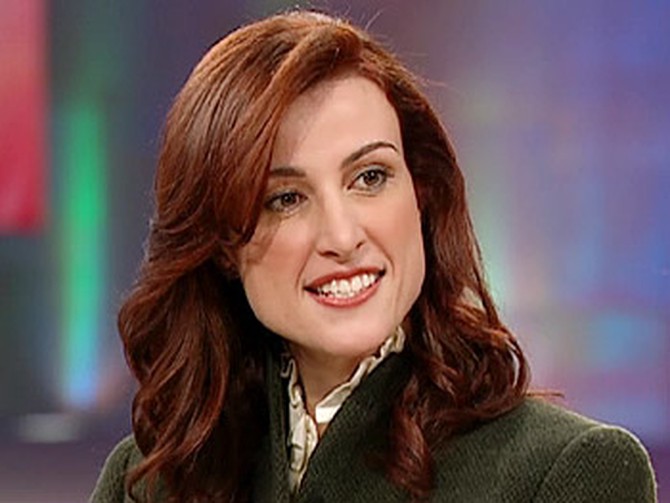
For millions of sleep-deprived mothers around the world, this woman's findings could be a miracle! Priscilla Dunstan, a mom from Australia with a special gift, says she's unlocked the secret language of babies.
When Priscilla was a toddler, her parents discovered she had a photographic memory for sound. At age 4, she could hear a Mozart concert on the piano and play it back note for note.
Priscilla says her gift has helped her hear a special "second language" beyond English, allowing her to detect moods and even diagnose illnesses! "Other people might hear a note but I sort of get the whole symphony," Priscilla says. "So when someone's speaking, I get all this information that other people might not pick up."
That mysterious second language took on an astounding new meaning when Priscilla became a mother to her baby, Tom. "Because of my gift for sound, I was able to pick out certain patterns in his cries and then remember what those patterns were later on when he cried again," Priscilla says. "I realized that other babies were saying the same words."
When Priscilla was a toddler, her parents discovered she had a photographic memory for sound. At age 4, she could hear a Mozart concert on the piano and play it back note for note.
Priscilla says her gift has helped her hear a special "second language" beyond English, allowing her to detect moods and even diagnose illnesses! "Other people might hear a note but I sort of get the whole symphony," Priscilla says. "So when someone's speaking, I get all this information that other people might not pick up."
That mysterious second language took on an astounding new meaning when Priscilla became a mother to her baby, Tom. "Because of my gift for sound, I was able to pick out certain patterns in his cries and then remember what those patterns were later on when he cried again," Priscilla says. "I realized that other babies were saying the same words."

After testing her baby language theory on more than 1,000 infants around the world, Priscilla says there are five words that all babies 0–3 months old say—regardless of race and culture:
Those "words" are actually sound reflexes, Priscilla says. "Babies all around the world have the same reflexes, and they therefore make the same sounds," she says. If parents don't respond to those reflexes, Priscilla says the baby will eventually stop using them.
Priscilla recommends that parents listen for those words in a baby's pre-cry before they start crying hysterically. She says there is no one sound that's harder to hear than others because it varies by individual. She also says some babies use some words more than others.
The Dunstan Baby Language DVD is currently available. Visit DunstanBaby.com to order your copy.
Those "words" are actually sound reflexes, Priscilla says. "Babies all around the world have the same reflexes, and they therefore make the same sounds," she says. If parents don't respond to those reflexes, Priscilla says the baby will eventually stop using them.
Priscilla recommends that parents listen for those words in a baby's pre-cry before they start crying hysterically. She says there is no one sound that's harder to hear than others because it varies by individual. She also says some babies use some words more than others.
The Dunstan Baby Language DVD is currently available. Visit DunstanBaby.com to order your copy.
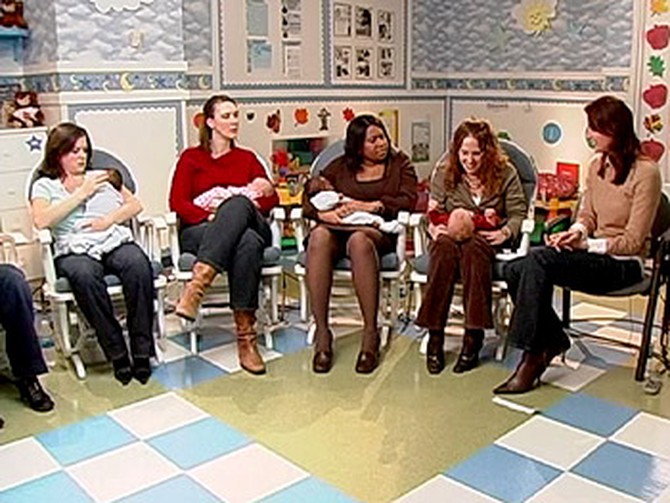
Priscilla met with eight new mothers, along with their nine newborn babies, to help them understand the universal language their children speak.
Each mom says they cope with their crying child differently. "My husband and I have a list," says Jessica, the mother of twins. "First it's diaper change. Feed. Check the clothing. Put the pacifier in the mouth. Give them a bath. ... In the end, nothing works."
The constant crying creates a lot of stress and frustration for these moms. "You just feel absolutely helpless. You want so much to be the one to comfort them and to kind of shelter them from whatever they're feeling," says new mom Danielle.
After Priscilla explains the cries, the moms are shocked to learn their babies are actually talking to them! After two hours with Priscilla, all nine babies are comfortable, happy and quiet.
"Who would have thought that all of our babies are trying to tell us something and we just didn't know it the whole time," says Erica, another new mom. "So it's amazing."
Each mom says they cope with their crying child differently. "My husband and I have a list," says Jessica, the mother of twins. "First it's diaper change. Feed. Check the clothing. Put the pacifier in the mouth. Give them a bath. ... In the end, nothing works."
The constant crying creates a lot of stress and frustration for these moms. "You just feel absolutely helpless. You want so much to be the one to comfort them and to kind of shelter them from whatever they're feeling," says new mom Danielle.
After Priscilla explains the cries, the moms are shocked to learn their babies are actually talking to them! After two hours with Priscilla, all nine babies are comfortable, happy and quiet.
"Who would have thought that all of our babies are trying to tell us something and we just didn't know it the whole time," says Erica, another new mom. "So it's amazing."
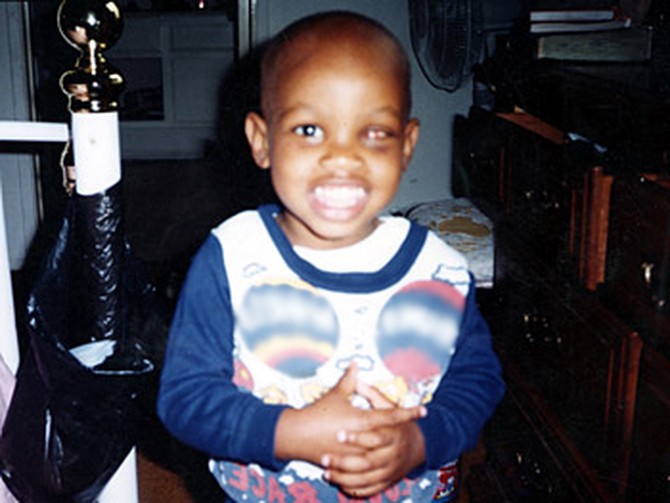
When Ben Underwood was born, his mother, Aqua, says he was a healthy, happy baby; but when Ben was two years old, Aqua noticed something alarming. "I noticed he couldn't see out of the left eye. It had a glow, a marble look. Like a cat's eye," she says.
Ben was diagnosed with retinal blastoma—cancer in both eyes. He underwent chemotherapy and radiation. When treatments failed, it was clear that Ben had to have his eyes removed or lose his life.
Just before his third birthday, doctors removed both of Ben's eyes. His eyes were replaced with prosthetics. "When he woke up from his surgery, Ben said, 'Mom, I can't see anymore,'" Aqua says. "I never told him he couldn't see. I've always told him, 'Your name is Benjamin. You can do anything.'"
Ben was diagnosed with retinal blastoma—cancer in both eyes. He underwent chemotherapy and radiation. When treatments failed, it was clear that Ben had to have his eyes removed or lose his life.
Just before his third birthday, doctors removed both of Ben's eyes. His eyes were replaced with prosthetics. "When he woke up from his surgery, Ben said, 'Mom, I can't see anymore,'" Aqua says. "I never told him he couldn't see. I've always told him, 'Your name is Benjamin. You can do anything.'"
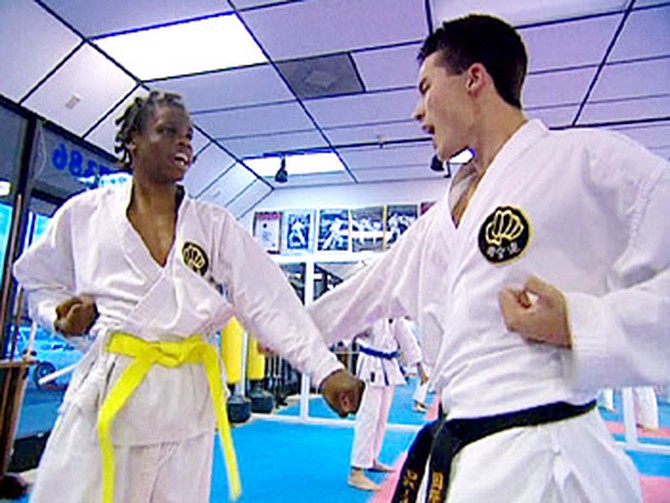
Four years later, Ben discovered he had an amazing gift. He can see the world through the click of his tongue. "By clicking my tongue on the top of my mouth ... it makes a sound and I hear things around me," Ben says.
The technical term for Ben's ability is called echolocation. Dolphins make a similar sound in the water to help them navigate, but experts say it's rare for a human to be able to do. Ben can tell what material is around him because each substance has its own sound.
At 14 years old, Ben is like any other teenager. He plays video games, hangs out with his friends, and takes regular classes at school. He even has a yellow belt in Karate and rollerblades.
Ben says his blindness won't ever hold him back. "I will never use a cane. A cane is for other people who cannot walk," Ben says. "I'm not falling over."
Ben even hopes to drive someday! He says he can do it with the help of radar and GPS. "Watch," Ben says. "I'm gonna do it, too."
The technical term for Ben's ability is called echolocation. Dolphins make a similar sound in the water to help them navigate, but experts say it's rare for a human to be able to do. Ben can tell what material is around him because each substance has its own sound.
At 14 years old, Ben is like any other teenager. He plays video games, hangs out with his friends, and takes regular classes at school. He even has a yellow belt in Karate and rollerblades.
Ben says his blindness won't ever hold him back. "I will never use a cane. A cane is for other people who cannot walk," Ben says. "I'm not falling over."
Ben even hopes to drive someday! He says he can do it with the help of radar and GPS. "Watch," Ben says. "I'm gonna do it, too."
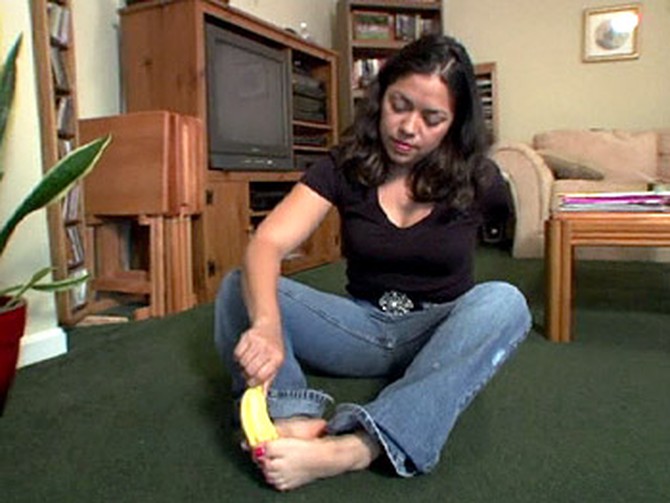
Claudia Mitchell had no idea when she accepted a friend's invitation to go on a motorcycle ride in the mountains that her life would change forever.
Claudia says on a dangerous curve, her friend lost control and they were both thrown from the bike. Claudia hit the guardrail and completely severed her arm at the shoulder joint. Rescuers found Claudia's arm down an embankment, eight feet from where she landed. She was rushed to the emergency room but doctors were unable to reattach it.
After two weeks in the hospital, Claudia went home to face her new life as an amputee. She quickly grew frustrated with the prosthetic arm doctors gave her, and stopped wearing it. "I felt like I was pretending, you know, like I didn't have my arm for a while, and then I would have it back and life would be okay again," Claudia says.
Claudia was forced to improvise. She learned to use her feet instead of her hands to accomplish the simplest tasks, like peeling a banana, but it was a hard adjustment. "I was angry that I had to use my feet," Claudia says. "I pictured a monkey, you know, sitting down opening a banana with their feet and I thought, 'I'm not human because I have to do it this way.'"
Claudia says on a dangerous curve, her friend lost control and they were both thrown from the bike. Claudia hit the guardrail and completely severed her arm at the shoulder joint. Rescuers found Claudia's arm down an embankment, eight feet from where she landed. She was rushed to the emergency room but doctors were unable to reattach it.
After two weeks in the hospital, Claudia went home to face her new life as an amputee. She quickly grew frustrated with the prosthetic arm doctors gave her, and stopped wearing it. "I felt like I was pretending, you know, like I didn't have my arm for a while, and then I would have it back and life would be okay again," Claudia says.
Claudia was forced to improvise. She learned to use her feet instead of her hands to accomplish the simplest tasks, like peeling a banana, but it was a hard adjustment. "I was angry that I had to use my feet," Claudia says. "I pictured a monkey, you know, sitting down opening a banana with their feet and I thought, 'I'm not human because I have to do it this way.'"
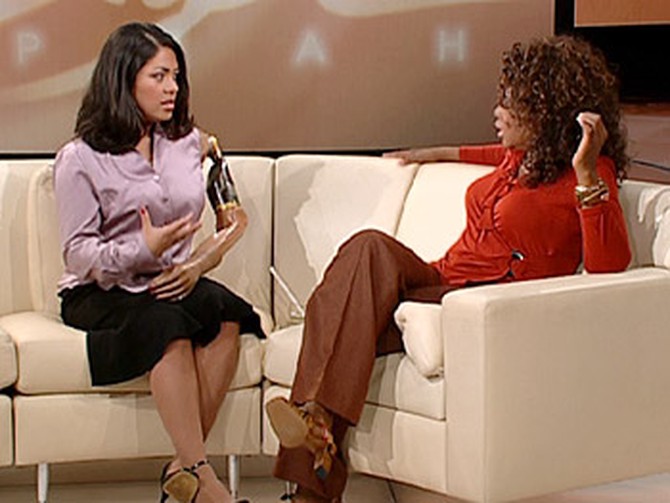
Claudia heard about a new-cutting edge mechanical arm. With relentless determination, she was accepted into a special study through the Rehabilitation Institute of Chicago and fitted with the $4 million arm—making her the first real-life bionic woman!
In order for Claudia's bionic arm to function, doctors had to perform a procedure that literally tricks Claudia's brain into thinking that her arm is still attached. Doctors reattached the nerves in Claudia's shoulder that were once connected to her amputated arm to her chest muscle. Electrodes connected to the bionic arm are then positioned over the areas of her chest to detect impulses from her muscles. "When I think that I want my hand to open or close or my elbow to move, it flexes a different muscle now."
Now, Claudia can put on makeup, fold her laundry, cook...almost anything with her new arm. "It's not comfortable to sleep in," Claudia says. "I can put it on and take it off just like I do a coat."
In order for Claudia's bionic arm to function, doctors had to perform a procedure that literally tricks Claudia's brain into thinking that her arm is still attached. Doctors reattached the nerves in Claudia's shoulder that were once connected to her amputated arm to her chest muscle. Electrodes connected to the bionic arm are then positioned over the areas of her chest to detect impulses from her muscles. "When I think that I want my hand to open or close or my elbow to move, it flexes a different muscle now."
Now, Claudia can put on makeup, fold her laundry, cook...almost anything with her new arm. "It's not comfortable to sleep in," Claudia says. "I can put it on and take it off just like I do a coat."
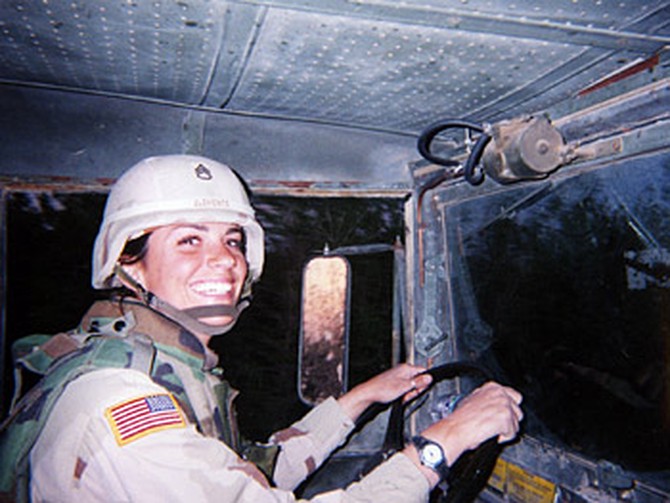
When she was a senior in high school in Akron, Ohio, Jessica Clements joined the Army reserves. She was deployed to Iraq, and though she was scared, she was ready to defend her country.
On May 5, 2004, Jessica's worst fear came true. A roadside bomb was detonated near the unarmored truck she rode in, along with eight other soldiers and a civilian. The shrapnel from the bomb shot into Jessica's lower back and penetrated her skull into three different lobes of her brain. As blood poured from her shattered skull, Jessica lay unconscious and near death. Helicopters immediately airlifted her to Baghdad, where doctors rushed Jessica to surgery.
She was given only a 2 percent chance of survival.
On May 5, 2004, Jessica's worst fear came true. A roadside bomb was detonated near the unarmored truck she rode in, along with eight other soldiers and a civilian. The shrapnel from the bomb shot into Jessica's lower back and penetrated her skull into three different lobes of her brain. As blood poured from her shattered skull, Jessica lay unconscious and near death. Helicopters immediately airlifted her to Baghdad, where doctors rushed Jessica to surgery.
She was given only a 2 percent chance of survival.
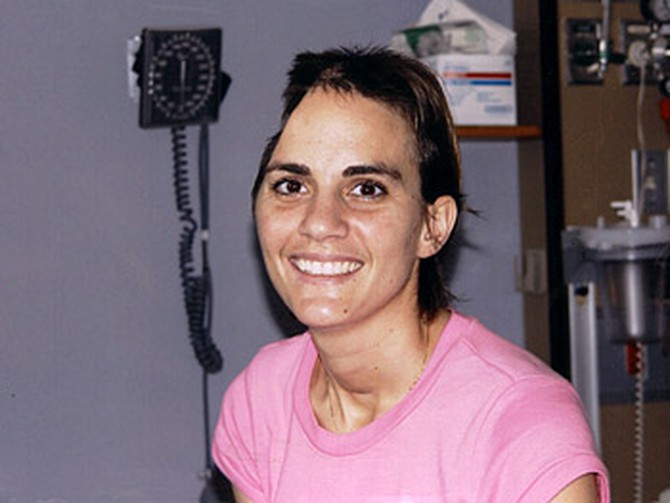
To remove the largest pieces of shrapnel from Jessica's brain, neurosurgeon Lieutenant Colonel Jeff Poffenbarger had to perform a craniectomy—he removed almost half of her skull. Then, on the hopes that the right section of Jessica's skull could one day be reattached, Poffenbarger sliced open Jessica's abdomen and placed the four-inch bone inside her body.
Then Dr. Poffenbarger put Jessica in a medically induced coma in hopes that the brain swelling would go down, a common course of action for severe head trauma patients. Even though some of his colleagues thought she should be sent home to die, he refused to give up and insisted Jessica have further treatment. While she was still in a coma, Jessica was transported back home. Her mother was told that the prognosis was grim.
Jessica has been called a "miracle girl" because after four months with nearly half her skull missing, three months in the hospital and nine months in outpatient care, she has recovered from her injuries. Though she doesn't remember anything of the explosion, she does remember having part of her skull in her abdomen. "The top portion of it was up by my lower ribs," Jessica says. "If I'd move a certain direction, the bottom part of it would touch my hip bone. It was very uncomfortable."
Then Dr. Poffenbarger put Jessica in a medically induced coma in hopes that the brain swelling would go down, a common course of action for severe head trauma patients. Even though some of his colleagues thought she should be sent home to die, he refused to give up and insisted Jessica have further treatment. While she was still in a coma, Jessica was transported back home. Her mother was told that the prognosis was grim.
Jessica has been called a "miracle girl" because after four months with nearly half her skull missing, three months in the hospital and nine months in outpatient care, she has recovered from her injuries. Though she doesn't remember anything of the explosion, she does remember having part of her skull in her abdomen. "The top portion of it was up by my lower ribs," Jessica says. "If I'd move a certain direction, the bottom part of it would touch my hip bone. It was very uncomfortable."
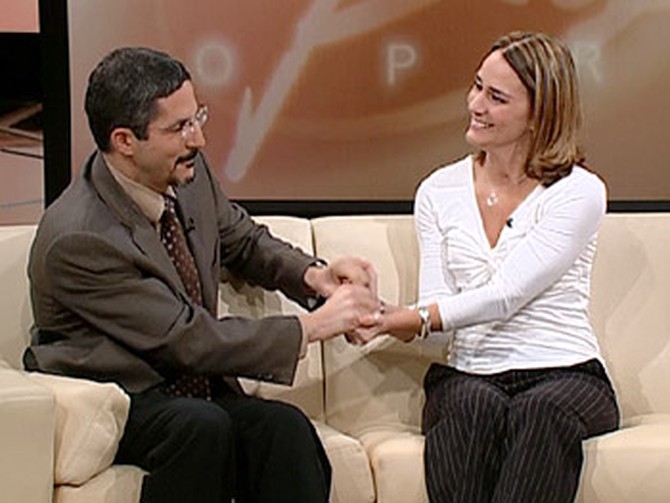
Though people call her a hero, Jessica says the real hero is the man who saved her life, Dr. Jeff Poffenbarger. Since that fateful day when he saved her life, Jessica has never met her hero...until now.
Dr. Poffenbarger—an Army neurosurgeon—says he performed up to seven craniectomies on soldiers a day in Iraq.
"I had decided when I went to Iraq that we were going to go straight to the wall for every wounded soldier," he says. "We weren't going to give up on any of them. In [Jessica's] case, she had a very devastating injury."
Dr. Poffenbarger says Jessica's condition when she arrived was bad and getting worse. "There was some thought she might pass away right there in the trauma bay, but I thought if we moved quickly, that we could save her," he says.
"I am so overwhelmed," Jessica says. "These are the hands that saved my life."
Dr. Poffenbarger—an Army neurosurgeon—says he performed up to seven craniectomies on soldiers a day in Iraq.
"I had decided when I went to Iraq that we were going to go straight to the wall for every wounded soldier," he says. "We weren't going to give up on any of them. In [Jessica's] case, she had a very devastating injury."
Dr. Poffenbarger says Jessica's condition when she arrived was bad and getting worse. "There was some thought she might pass away right there in the trauma bay, but I thought if we moved quickly, that we could save her," he says.
"I am so overwhelmed," Jessica says. "These are the hands that saved my life."
Published 09/23/2008

